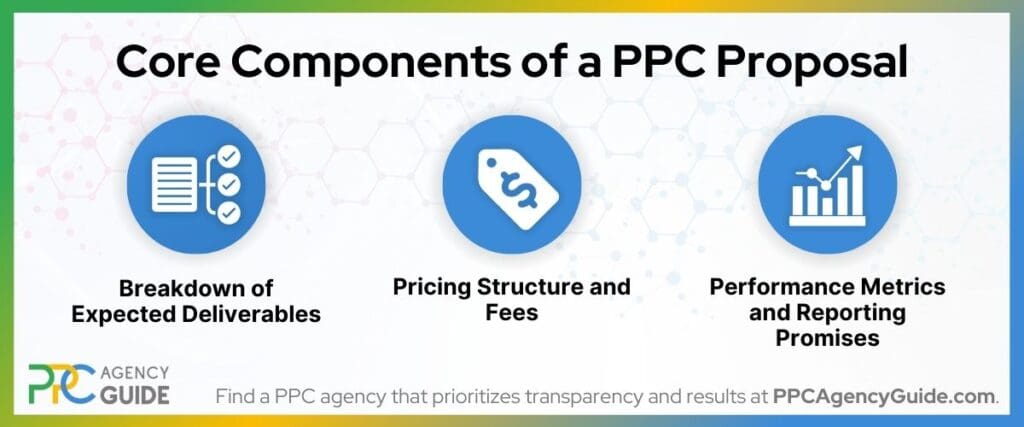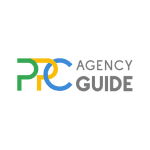
Not sure what to look for when evaluating pay-per-click (PPC) proposals? It’s not something most businesses do often but knowing what to look for can help ensure you have the right expectations, boost your success, and protect your company.
On this page, we’ll walk you through the basic components of PPC proposals, common terms and conditions that will impact your experience, potential red flags, and how to choose between multiple proposals to find the best fit.
Core Components All PPC Proposals Should Cover
A well-structured PPC proposal should clearly outline what an agency will deliver, how they will charge for it, and how they will measure success. Let’s dig into the details of what that really means.

Breakdown of Expected Deliverables
PPC Proposals should outline exactly what the agency will handle to ensure there are no surprises later.
Campaign Setup: The Foundation of Your Ads
A well-built campaign structure is critical to performance. The proposal should specify whether the agency will handle:
- Account Setup and Restructuring: Creating new ad accounts or optimizing existing ones.
- Conversion Tracking: Implementing tracking to measure campaign success.
- Audience Research: Refining targeting based on business goals.
- Campaign Structure: Separating branded and non-branded keywords for better control.
Ad Creative: Who Provides It
A PPC campaign needs compelling ad copy, images, and videos to drive engagement. The proposal should clarify:
- Creative Responsibilities: Whether the agency writes ad copy, designs images, or produces video.
- Creative Refreshes: How often the ads will be updated to prevent ad fatigue.
- Ad Variation Testing: Whether they conduct A/B testing to improve performance. This step alone can double your clickthrough rates, according to WordStream research.
Keyword Strategy: How it’s Determined
A strong keyword strategy ensures your budget is spent on high-value search terms. The proposal should explain:
- Research Methodology: Whether they analyze competitors, use historical data, or rely on automation.
- Keyword Intent: Whether they focus on conversion-driven keywords or just broad traffic.
- Negative Keyword Strategy: How they prevent wasted spend on irrelevant searches.
Landing Page Recommendations: Are They Included?
A typical landing page converts just under ten percent of visitors, according to HubSpot. Your goal is to meet or exceed this. Landing pages impact conversion rates as much as ad copy. The proposal should state whether the agency will address:
- Landing Page Audits: Reviewing and recommending landing page improvements.
- Landing Page Creation: Designing and building new pages or simply offering guidance.
- A/B Testing: Testing variations to increase conversion rates.
Ad Testing and Optimization Cadence: How Often it Happens
PPC campaigns require ongoing adjustments to maintain performance. The proposal should specify:
- Optimization Frequency: How often they test and refine ads.
- Bid Strategy: Whether bid adjustments are manual or automated.
- Targeting Adjustments: How frequently they refine audience settings.
Note that a typical agency spends two to four hours per week per client managing ads, per WordStream. But, a full quarter invests less than an hour. That might be fine for very small accounts but is unlikely to be sufficient for long-term growth. Find out how much time they typically invest and what tasks they’re performing with that time.
Pricing Structure and Fees
PPC pricing models vary, but transparency is essential. Hidden fees and unclear pricing structures can lead to unexpected costs.
Flat Fee vs. Percentage of Ad Spend: How They Charge
Agencies typically use one of two pricing models:
- Flat Fee Pricing: A set monthly rate for campaign management.
- Percentage-Based Pricing: A percentage of your ad spend, typically between ten and 30 percent.
Hidden Fees: Where Additional Costs Appear
Some agencies include extra charges in the fine print. Watch for:
- Platform Fees: Additional costs beyond what you pay to a PPC platform like Google Ads or Meta Ads.
- Ad Spend Markups: Agencies bill you for the total ad cost but take a cut before passing it to the platform.
- Service Add-Ons: Extra charges for reporting, landing page audits, or account access.
Minimum Ad Spend Requirements: How Much You Must Invest
Some agencies require a minimum monthly ad spend that can range from a few thousand dollars to six figures. Ensure their minimum aligns with your budget and goals.
Payment Terms and Frequency: When Payments Are Due
Understanding billing terms prevents surprises when you receive your PPC agency’s invoice. Consider:
- Prepayment vs. Post-Payment: Whether you pay upfront or after services are rendered.
- Billing Frequency: Whether payments are monthly, quarterly, or tied to performance.
- Contractual Penalties: Whether there are fees for early termination of your PPC contract.
Performance Metrics and Reporting Promises
A PPC agency should track, analyze, and explain results. A strong proposal will outline clear performance expectations and how they’ll handle reporting.
Key Performance Indicators (KPIs): How Success is Measured
A proposal should specify which metrics will determine campaign performance, including:
- Click-Through Rate (CTR): Measures how often people click on your ad after seeing it.
- Cost Per Click (CPC): Tracks how much you pay for each ad click.
- Conversion Rate: Determines the percentage of visitors who complete a desired action.
- Return on Ad Spend (ROAS): Calculates the revenue generated from ad spend.
Reporting Frequency: How Often You Will Receive Updates
A PPC proposal should define how and when performance updates will be shared. Look for:
- Regular Reporting: Whether reports are weekly, biweekly, or monthly.
- Report Format: Whether insights are provided via dashboards, PDFs, or live access.
- Account Manager Review: Whether reports will be explained in strategy meetings.
Spotting Red Flags in PPC Proposals
Most PPC agencies are committed to helping businesses succeed. They invest time, expertise, and resources into running effective campaigns. However, not every agency is a perfect fit for every business, and some proposals may contain oversights, unclear terms, or potential pitfalls that should be addressed before signing.
Recognizing these red flags early can help you ask the right questions, clarify expectations, and ensure you are entering a well-structured agreement.
Overpromised Results: When Guarantees Sound Too Good
PPC is a performance-based marketing channel, but results depend on competition, market conditions, and ongoing strategy adjustments. Be cautious of proposals that promise guaranteed returns or instant success.
- Unrealistic Guarantees: Phrases like “We guarantee a 5X return in 30 days” or “100 leads per week” are not industry-standard because performance fluctuates. A reputable agency will provide data-driven projections but acknowledge that results take time.
- Lack of Data to Support Claims: If an agency makes bold performance promises, it should back them up with case studies or historical data.
- Aggressive Growth Timelines: PPC optimization takes time. Most campaigns go through an adjustment period before stabilizing. If an agency claims otherwise, ask how they plan to achieve results so quickly.
While high returns are possible with a well-managed campaign, they are never instant or guaranteed. A strong agency sets realistic expectations, provides benchmarks from similar industries, and explains how results will be tracked and improved over time. Instead of making bold claims, they focus on building a strategy that adapts to performance data and market conditions.
Lack of Transparency in Fees: Understanding the Full Cost
PPC management comes with costs, but every dollar should be accounted for upfront. Hidden charges or vague pricing structures can make it difficult to evaluate the true value of an agency’s services.
- Unclear Management Fees: A proposal should clearly outline what is included in the management fee. Does it cover strategy, bid management, and reporting, or are some elements charged separately?
- Ad Spend Markups: Some agencies bill clients for ad spend through their own accounts while taking a percentage. This practice limits visibility into actual costs.
- Additional Fees for Standard Services: Some proposals separate key tasks like conversion tracking or landing page audits as add-ons. If essential services are extra, make sure they align with your budget and expectations.
Hidden fees are not always intentional, but unclear pricing can make it difficult to assess the true cost of working with an agency. A well-structured proposal provides a detailed breakdown of fees, outlining exactly what is included in the management cost and what, if anything, comes at an additional charge. If anything is unclear, asking for clarification upfront can prevent unexpected costs later.
Limited or No Ad Account Access: Who Owns the Data?
Full access to your ad accounts is essential for transparency, long-term control, and accountability. While some agencies manage campaigns under their own accounts for convenience, this can create challenges if you decide to part ways.
- No Direct Access: If an agency runs ads under their account, you may not be able to access historical performance data if you switch providers.
- Restricted Viewing: Some agencies grant limited access rather than full admin rights, making it difficult to monitor spending.
- No Clear Ownership Terms: If you later decide to bring PPC in-house or switch agencies, will you retain control over the account, ad creatives, and audience data?
Maintaining access to your ad accounts ensures transparency and gives you control over your campaign history, audience data, and performance insights. A well-structured proposal should clarify account ownership and access levels from the start. If an agency manages campaigns under its own account, discuss how data and assets will be transferred if the contract ends to avoid disruptions in your advertising efforts.
Vague or One-Size-Fits-All Strategies: Lack of Customization
A strong PPC proposal should reflect your industry, target audience, and business goals. Generic proposals that do not account for your unique needs may not deliver the best results.
- Minimal Research on Your Industry: If the proposal lacks details about your business model or competitive landscape, it may not be tailored to your needs.
- Pre-Packaged Service Tiers: Some agencies offer fixed pricing tiers with set deliverables, which can be great for budgeting but may not always align with your business goals.
- Lack of Testing and Optimization Plans: PPC success depends on ongoing adjustments. A proposal should outline how campaigns will be monitored, optimized, and improved over time.
Mismatch with Best Practices
You can use our PPC Audit Guide to perform your own evaluation before talking to agencies. Even if you don’t intend to do the work yourself, it will help you better understand the work involved and your opportunities, so it’s easier to gauge if their strategy is sound.
A well-structured proposal should demonstrate that the agency understands your industry and has a strategy tailored to your goals. While standardized service tiers can work in some cases, a strong proposal will explain how the agency plans to adjust and optimize campaigns based on performance data. Look for details on how strategies will evolve over time to ensure long-term success.
How to Make an Informed Decision When Comparing Proposals
Once you have multiple PPC proposals in hand, the challenge shifts from identifying red flags to determining which agency is the best fit for your business. Making the right choice involves finding an agency that aligns with your goals, communicates clearly, and provides the best value for your investment.

Apples-to-Apples Comparison of Pricing and Services
No two agencies structure their proposals exactly the same, which can make direct comparisons difficult. Instead of looking at price alone, break down what each agency is offering and how it aligns with your needs.
- Scope of Work: One agency may offer a lower management fee but require you to handle ad creative or landing page development separately. Another may provide full-service management but charge more. Ensure you are comparing like-for-like services.
- Level of Account Management: Some agencies focus purely on campaign execution, while others offer strategic consulting, competitor analysis, and audience research. Determine how much guidance and support you need.
- Ad Budget Allocation: If an agency charges a percentage of ad spend, look at how much of your budget will go toward actual advertising versus management fees. A lower management fee is not necessarily better if it comes with less optimization and strategic oversight.
A detailed, transparent proposal should make it easy to see exactly what you are paying for. If an agency’s pricing structure is unclear, ask for a breakdown before making a decision.
Assessing Communication and Reporting Standards
PPC campaigns require ongoing adjustments and data-driven refinements. The agency you choose should be one that prioritizes clear, consistent communication and ensures you have visibility into performance.
- Reporting Frequency: Will you receive updates weekly, biweekly, or monthly?
- Report Format: Are reports automated, or will an account manager walk you through key insights and recommendations?
- Real-Time Data Access: Will you have full access to your ad accounts, or will you only see filtered reports?
- Responsiveness: How quickly can you expect responses to questions or requests?
Strong agencies do not just send reports. They explain the data, highlight trends, and offer strategic recommendations to improve performance. If a proposal does not include details on reporting and communication, ask how they plan to keep you informed.
Weighing Experience Against Cost
Cost is always a factor, but an experienced agency that charges more may ultimately deliver better results and a stronger return on investment than a lower-cost alternative.
- Industry Experience: Has the agency worked with businesses like yours? If they specialize in a different industry, do they have a strategy for adapting their approach to fit your market?
- Case Studies and References: Can they provide real-world examples of businesses they have helped? Look for case studies that include concrete performance metrics rather than vague success claims.
- Adaptability: PPC changes constantly. Agencies that stay ahead of trends and platform updates will be better equipped to adjust your strategy as needed.
While it may be tempting to choose the least expensive proposal, a well-optimized campaign pays for itself through better performance and higher returns.
Questions to Ask Before Making a Final Decision and Signing
Once you have compared proposals and identified the agency that best aligns with your goals, the final step is to ensure that all expectations are clear before signing the contract. Asking the right questions upfront can prevent misunderstandings and ensure a smooth partnership.
Can They Provide Case Studies or References?
A strong PPC agency should be able to demonstrate past success through case studies or client references. While every campaign is unique, seeing real-world examples of how they have helped businesses like yours can provide confidence in their approach.
- Look for Detailed Performance Metrics: Instead of general claims, case studies should include concrete data such as conversion rates, cost per acquisition, and return on ad spend.
- Ask for Client References: Speaking with a current or former client can provide insight into the agency’s communication, strategy, and ability to deliver results.
- Consider Industry Relevance: If they have experience in your industry, they are more likely to understand your audience, competition, and market trends.
What Happens if the Partnership Does Not Work Out?
No business relationship is guaranteed to be a perfect fit. Understanding the agency’s contract terms, exit process, and potential penalties before signing can save frustration later.
- Contract Length and Flexibility: Is there a fixed-term contract, or can you adjust or exit at any time?
- Notice Period for Cancellation: If you decide to end the agreement, how much notice is required?
- Data and Account Ownership: Will you retain full control over your ad accounts, creative assets, and campaign history if you switch providers?
If the contract heavily favors the agency and does not provide a clear exit path, discuss adjustments before committing.
Will They Help with the Transition if You Leave?
Whether you stay with the agency for years or eventually move PPC in-house, having a smooth transition process in place ensures you do not lose valuable campaign data or performance insights.
- Access to Historical Data: Will they provide a full handoff of campaign performance data and account insights?
- Collaboration with a New Provider: If you switch agencies, will they work with your new provider to ensure a smooth transition?
- Account Structure Documentation: A well-organized agency should have records of campaign structures, audience targeting, and optimization strategies.
Reputable agencies prioritize long-term client success and will not make transitions difficult if you decide to move in another direction.
Find a PPC Agency That Prioritizes Transparency and Results
A well-structured PPC proposal lays the groundwork for a strong agency partnership. The right agency will clearly outline deliverables, pricing, and performance expectations to eliminate uncertainty and ensure your campaigns are set up for success.
To be matched with a vetted PPC agency that values transparency and delivers measurable results, request a complimentary consultation.
FAQs on Evaluating PPC Proposals
How do I compare PPC agency pricing structures?
Compare pricing by breaking down what is included in the management fee versus additional costs. Look at whether the agency charges a flat fee or a percentage of ad spend and whether services like landing page audits, conversion tracking, and reporting are included or come at an extra cost.
What red flags should I look for in a PPC proposal?
Be cautious of guaranteed results, hidden fees, limited account access, vague deliverables, or one-size-fits-all strategies. A strong agency will be transparent about pricing, provide a clear plan tailored to your business, and outline how performance will be tracked and optimized over time.
How can I tell if a PPC agency is overcharging me?
Compare multiple proposals and look for clear breakdowns of costs. Watch for platform fee markups, unclear ad spend allocation, or extra charges for standard services. A reputable agency should provide a transparent pricing model that aligns with industry standards and offers measurable value.
What questions should I ask before signing a PPC contract?
Ask about account ownership, contract flexibility, performance tracking, and reporting frequency. Clarify how fees are structured, what happens if you need to terminate the contract, and whether the agency will assist with transitions if you decide to switch providers in the future.
How do I know if a PPC agency is a good fit for my business?
Look for industry experience, a clear strategy, transparent pricing, and strong communication. A good agency should be able to explain how they will tailor their approach to your goals, provide case studies or references, and offer data-driven insights into expected performance.
Should I choose a flat-fee or percentage-based PPC pricing model?
A flat fee provides cost predictability, while a percentage of ad spend scales with your budget. If choosing percentage-based pricing, ensure the agency is incentivized to optimize—not just increase spending. The best model depends on your budget, business goals, and the level of service provided.
How can I ensure transparency in a PPC agency proposal?
Look for detailed breakdowns of costs, clear deliverables, and full access to ad accounts. A trustworthy agency should openly share how ad spend is allocated, provide insights into optimization strategies, and ensure you can track performance at any time.
What performance metrics should a PPC proposal include?
Key performance indicators (KPIs) should include click-through rate (CTR), cost per click (CPC), conversion rate, return on ad spend (ROAS), and cost per acquisition (CPA). A strong proposal should explain how these metrics will be monitored and improved over time.


















